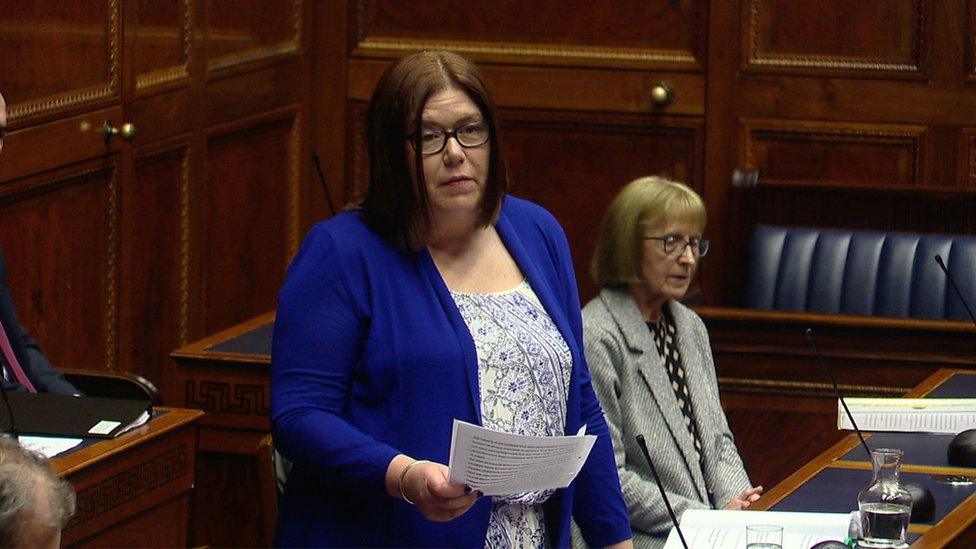Northern Ireland funding cuts: We'll pay the price, warns Barnardo's chief
- Published

Cuts to Stormont funding for children and young people are a false economy, MPs have been told.
Director of Barnardo's in Northern Ireland Michele Janes made the comments during a hearing of the Northern Ireland Affairs Committee.
"We will pay the price for these cuts for many years to come," Ms Janes told the hearing.
MPs were also told that investment in childcare and early years education is "a key mechanism in economic growth".
The Northern Ireland Affairs Committee is carrying out an inquiry into the funding and delivery of public services in Northern Ireland.

Michele Janes from Barnardo's warned about the long-term cost of funding cuts
Its latest hearing included evidence from representatives of the community and voluntary sector as well as two leading economists.
There have been numerous recent cuts made by the Department of Education (DE) as it seeks to save money.
But many organisations in the community and voluntary sector who work with children and families in disadvantaged areas have also faced reductions in funding.
Ms Janes told the committee that funding of public services in Northern Ireland was "really at breaking point".
"If this budget's implemented as it is, the impacts will not only be felt immediately by children, families, schools and communities but those impacts will continue in the long-term," she said.
"We will pay the price for these cuts for many years to come."
The chief executive of the Northern Ireland Council for Voluntary Action (NICVA), Celine McStravick, said that groups in the community and voluntary sector were being treated with "relentless, relentless disrespect".
"It's our sector that is holding the fabric of society together," she told MPs.
"As need is increasing, funding is decreasing. We have rising pressures on salary costs, fuel and energy costs, insurance costs, rent.
"We don't expect a blank cheque, but at the minute we're in a complete no-man's land."
'Grim for mental health'
The chief executive of Action Mental Health, David Babington, also told the committee that the budget was "grim yet again for mental health".
Later, MPs heard evidence from the chair of the NI Fiscal Council, Sir Robert Chote, and Dr Lisa Wilson, senior economist at the Nevin Economic Research Institute.
Sir Robert said that the lack of a functioning Northern Ireland Executive had made "good budget management" more difficult.
"It would have been a difficult environment anyway because of the inflation and pay pressures in general and you also have the ongoing Barnett squeeze," he said.
During her evidence, Dr Wilson said that investment in childcare and early years education was "a key mechanism in economic growth".
A recent review by the Department of Education suggested that the majority of parents on low and middle-incomes "consider childcare to be unaffordable", though those on higher incomes also struggle.
"We should not take lightly the serious business of what early years is," Dr Wilson said.
"The investment that goes into children at that age really is lacking."
Related topics
- Published24 May 2023

- Published17 June 2023

- Published15 March 2023

- Published23 June 2023

- Published15 March 2023
